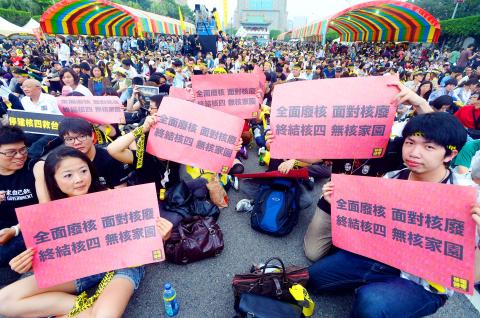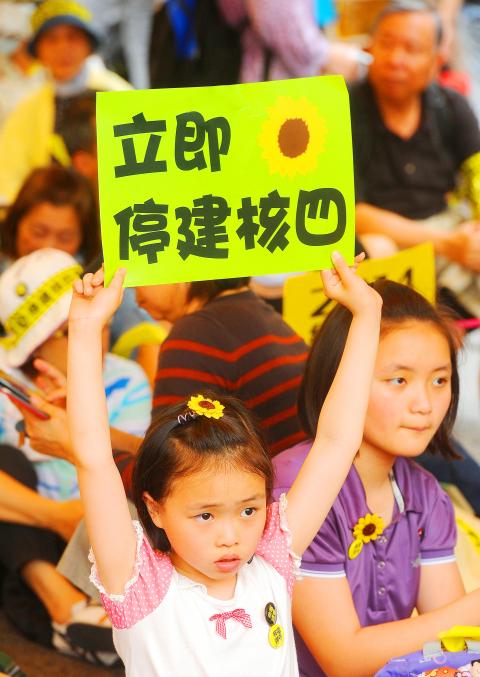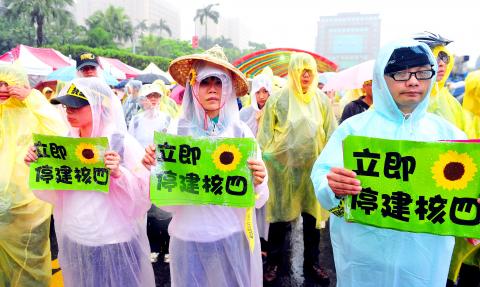Thousands of activists and protesters participated in an anti-nuclear protest on Ketagalan Boulevard in front of the Presidential Office Building yesterday afternoon, the fifth day of former Democratic Progressive Party chairman Lin I-hsiung’s (林義雄) hunger strike, demanding that the government abolish nuclear power.
As yesterday also marked the 28th anniversary of the Chernobyl disaster in Ukraine, the host of the evening event, Green Citizens’ Action Alliance secretary-general Tsuei Su-hsin (崔愫欣), said the sit-in yesterday was held not only to support Lin, but also to voice the long-term demands of the platform — an alliance of more than 120 civic groups — and the public.
“Lin’s hunger strike has inspired various anti-nuclear social movements by individuals and groups across the nation in the past few days,” said another host of the event, Citizen of the Earth, Taiwan’s (CET) Taipei Office director Tsai Chung-yueh (蔡中岳).

Photo: Wang Yi-sung, Taipei Times
“The event tonight marks the beginning of [us] occupying Ketagalan Boulevard until the government responds to our demands,” he added.
Shortly after the evening event began at about 4:30pm, a sudden downpour forced the protesters to scatter for shelter in the few rain sheds erected on the boulevard, but as volunteer workers gave out raincoats, many protesters streamed back to the front of the main stage.
Small children in raincoats playing in puddles, young people walking barefoot in the rain with anti-nuclear flags draped over their shoulders and families huddling together under an umbrella could be seen in front of the stage, while academics and activists spoke above them.

Photo: Liu Hsin-de, Taipei Times
“Terminate nuclear power, return rights to the people,” the protesters shouted out together from time to time.
Their main demands were to halt the Fourth Nuclear Power Plant’s construction immediately and not extend the lifespan of the three operating plants, and also to amend the Referendum Act (公民投票法) to enforce direct democracy.
The organizers said although the Chinese Nationalist Party (KMT) caucus passed a conclusion on Thursday that “the Fourth Nuclear Power Plant construction project should be completed and go through safety inspections, but will not have fuel rods inserted nor begin operation, and whether the plant goes into operation in the future will be decided through a referendum,” it was only a trick to stall for time.

Photo: Chien Jung-fong, Taipei Times
“The KMT’s solution is definitely not a concession,” said Chiu Hua-mei (邱花妹), assistant professor of sociology at National Sun Yat-sen University. “The government is irresponsible for accepting this solution, which is counter to anti-nuclear groups’ demand, for which Lin is sacrificing his health and up to 70 percent of the public support.”
Chiu said through public discussions many people are well aware that nuclear power plants pose high safety risks and that Taiwan’s geography is not suitable for developing nuclear power, so the nation should use its limited resources for transforming the energy model.
“But the government won’t listen, and still threatens the public with an increase in electricity prices, which would result from abolishing nuclear power,” she said.
CET executive director Lee Ken-cheng (李根政) said he feels sad because the government officials in power are indifferent toward Lin’s hunger strike, which is because they have not been deprived of their family or their rights, and are now even the oppressors of democracy who do not understand why the public stood up yesterday to fight for their rights.
Kuo Ching-lin (郭慶霖), chief executive of the Northern Coast Anti-Nuclear Action Alliance, said Taiwan’s northern coastline has beautiful natural scenery, but there are already two unsafe nuclear power plants along its 85km coastline, producing highly radioactive spent fuel that will remain dangerous for tens of thousands of years, and still the government does not ask the public’s opinion when making nuclear policies.
Gongliao Anti-Nuclear Self-Help Association chairman Wu Wen-chang (吳文樟) said he and his neighbors can see the chimneys of the Fourth Nuclear Power Plant from their homes and have lived in fear for the past 30 years, but while public opinion is in favor of halting operation of the power plant, the government still insists on going against the people.
Music by Hakka singer-songwriter Lo Sirong (羅思容), Hakka folk singer Lin Sheng-xiang (林生祥) and iconic Hoklo (also known as Taiwanese) folk singer Chen Ming-chang (陳明章) were performed between speeches.
Tsuei told the crowd that although they applied for a protest parade to take place today, the police had already blocked roads and encircled government buildings with barbed wire and barricades, so they would perform a civic non-cooperation movement of occupying an intersection during the parade.
After the main rounds of speeches ended, the event continued into the night with discussion sessions, screenings of documentaries and an overnight sit-in protest.
Anti-nuclear events, including more discussion sessions and the protest parade, are planned for today on the boulevard.

SECURITY: As China is ‘reshaping’ Hong Kong’s population, Taiwan must raise the eligibility threshold for applications from Hong Kongers, Chiu Chui-cheng said When Hong Kong and Macau citizens apply for residency in Taiwan, it would be under a new category that includes a “national security observation period,” Mainland Affairs Council (MAC) Minister Chiu Chui-cheng (邱垂正) said yesterday. President William Lai (賴清德) on March 13 announced 17 strategies to counter China’s aggression toward Taiwan, including incorporating national security considerations into the review process for residency applications from Hong Kong and Macau citizens. The situation in Hong Kong is constantly changing, Chiu said to media yesterday on the sidelines of the Taipei Technology Run hosted by the Taipei Neihu Technology Park Development Association. With

CARROT AND STICK: While unrelenting in its military threats, China attracted nearly 40,000 Taiwanese to over 400 business events last year Nearly 40,000 Taiwanese last year joined industry events in China, such as conferences and trade fairs, supported by the Chinese government, a study showed yesterday, as Beijing ramps up a charm offensive toward Taipei alongside military pressure. China has long taken a carrot-and-stick approach to Taiwan, threatening it with the prospect of military action while reaching out to those it believes are amenable to Beijing’s point of view. Taiwanese security officials are wary of what they see as Beijing’s influence campaigns to sway public opinion after Taipei and Beijing gradually resumed travel links halted by the COVID-19 pandemic, but the scale of

A US Marine Corps regiment equipped with Naval Strike Missiles (NSM) is set to participate in the upcoming Balikatan 25 exercise in the Luzon Strait, marking the system’s first-ever deployment in the Philippines. US and Philippine officials have separately confirmed that the Navy Marine Expeditionary Ship Interdiction System (NMESIS) — the mobile launch platform for the Naval Strike Missile — would take part in the joint exercise. The missiles are being deployed to “a strategic first island chain chokepoint” in the waters between Taiwan proper and the Philippines, US-based Naval News reported. “The Luzon Strait and Bashi Channel represent a critical access

Pope Francis is be laid to rest on Saturday after lying in state for three days in St Peter’s Basilica, where the faithful are expected to flock to pay their respects to history’s first Latin American pontiff. The cardinals met yesterday in the Vatican’s synod hall to chart the next steps before a conclave begins to choose Francis’ successor, as condolences poured in from around the world. According to current norms, the conclave must begin between May 5 and 10. The cardinals set the funeral for Saturday at 10am in St Peter’s Square, to be celebrated by the dean of the College